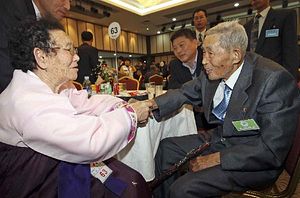A few curated links covering events in Japan and the Koreas:
On Wednesday, North Korea and South Korea set a date to reunite certain families separated by the Korea War. Hundreds of elderly relatives will see their separated family members on the other side of the demilitarized zone from February 20-25. The last such reunion took place in 2010 after which the program was suspended as relations soured. That the reunions will take place at all represents a victory for South Korea Prime Minister Park Geun-hye who lobbied Pyongyang hard on the issue earlier this year. It remains to be seen if the reunions could reinvigorate talks between the North and the South, still technically at war since the 1950s.
Historical analogies to the first and second World War seem to be in vogue as of late. After President Benigno Aquino of the Philippines compared China’s actions in the Scarborough Shoal to ceding the Sudetenland to Hitler, North Korea’s KCNA news agency flat-out denounced Japanese Prime Minister Shinzo Abe as “Asian Hitler.” The outburst was likely prompted by news that Japan is looking to revise its self-imposed constitutional ban on collective self defense. I wrote more on those developments over at Flashpoints.
Reuters takes a look at a less-cited variable Japan’s shifting security calculus: the U.S. alliance. The authors of the report argue that while in public Shinzo Abe is keen to point out China and North Korea as the reasons driving his bid to revise Japan’s constitutional ban on collective self-defense and moving it towards defense normalization, he is equally concerned that the “United States may one day be unable or unwilling to defend Japan.” The report additionally ties Abe’s contemporary anxieties to those of his grandfather Nobusuke Kishi.
IHS Jane’s Defense Weekly has a report alleging that “China’s influence over its North Korean client state is at an all-time low.” According to observers and sources in Beijing, North Korea under Kim Jong-un is less acquiescent to Beijing’s requests. The execution of Jang Song-thaek, conventionally seen as Beijing’s man in Pyongyang, served to highlight this growing rift between Beijing and Pyongyang.
North Korea’s official Rodong Sinmun slammed the United States as the prime reason that inter-Korean relations have not improved in recent years. “The U.S. has employed every manner to impede the improvement of the inter-Korean relations,” it said.
Kim Jong-un, in a new bid to entrench his personality cult, visited an orphanage in North Korea which resulted in some particularly interesting photo-ops.

































